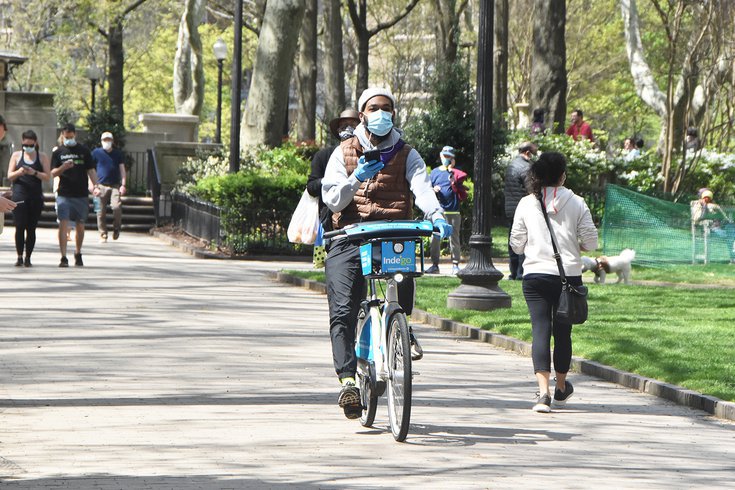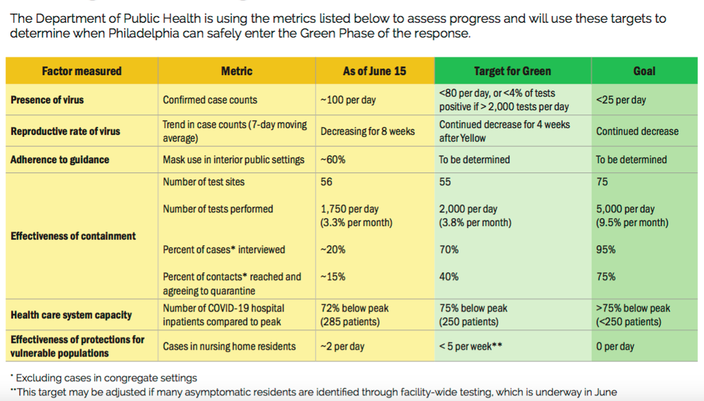
June 30, 2020
 HUGHE DILLON/for PhillyVoice
HUGHE DILLON/for PhillyVoice
Plans for Philadelphia to enter the green phase of Pennsylvania's COVID-19 reopening process have been delayed until August 1 at a minimum, Health Commissioner Dr. Thomas Farley said.
Philadelphia has delayed entering the green phase of Pennsylvania's COVID-19 reopening process until Aug 1. The city had targeted to begin the green phase on Friday but is scrapping that plan which would have further eased business and social restrictions in the city.
Health Commissioner Dr. Thomas Farley said Tuesday that key metrics for the coronavirus indicate that a move to the green phase would be premature.
"Unfortunately, the targets we laid out to go to green will not be met by this Friday," Farley said.
Of the new COVID-19 cases, the largest increase of patients in Philadelphia has been among residents under 30 years old, who account for 34% of the city's new cases during the past two weeks. Prior to this period, people younger than 30 represent just 20% of diagnoses in Philadelphia.
Through contact tracing efforts, many of these younger patients have been linked to visits to the Jersey Shore, social gatherings and other high-risk settings, Farley said.
Earlier this month, city officials pegged July 3 as a target date for the green phase and issued a series of guidelines covering how Philadelphia could safely reopen. At the same time, Farley warned that if momentum were to swing in the wrong direction, Philadelphia would exercise caution.
Last week, amid record case numbers recorded in Sunbelt states, Farley said Philadelphia appeared to be entering a "second wave" of infections. While the increase in cases has been modest and both fatalities and hospitalizations have dropped significantly, officials said Tuesday that pausing plans to reopen is the best course.
"We feel like this is the right decision at this point, but it's something we're going to have to evaluate going forward," Farley said.
The health commissioner acknowledged that the choice was a tough call.
"It is a difficult decision because we are concerned about the economy of Philadelphia, the social effects of that, and the health effects of the social effects," said Farley. "I've said before, the virus kills, but poverty kills, too."
As of this Friday, Philadelphia will enter a "modified restricted green phase," with allowances for outdoor activities or where masks can be worn and reinforced.
Museums, libraries, indoor shopping malls and casinos will be allowed to open in the city on Friday, but no food or beverages will be allowed indoors. Gatherings of up to 50 people will be allowed outdoors in accordance with city's Safe Mode guidance.
The businesses that reopened on June 26 — barbershops, salons and residential and private swimming pools — will continue to remain open. Outdoor dining, which is considered a lower risk for viral transmission, will continue under the currently established guidelines.
Indoor dining at restaurants will not be permitted until the city is able to reevaluate progress. Gyms and fitness centers also will remain closed.
"We think it's better to be cautious now than — like Texas and Florida — open up restaurants and regret it later," Farley said.
Philadelphia reported an additional 142 cases of COVID-19 on Tuesday, bringing the city's total to 26,133. Over a seven-day period, Philadelphia is averaging about 100 cases, which is above the benchmark of 80 that the city had set to enter the green phase, along with other key metrics included in the chart below.
In Allegheny County, Pittsburgh shut down bars and alcohol sales in restaurants amid a spike in COVID-19 cases after the county moved to the green phase on June 5.
Farley has maintained that Philadelphia must see strong compliance with the city's mandatory mask order, instituted last week, if residents hope to resume more activities and see them remain open. A media campaign urging residents to wear masks is expected to begin in the near future.
At least 16 states have rolled back plans for reopening as coronavirus infections surged past 2.5 million this week and the national death toll climbed above 126,000.
Philadelphia will continue to take a cautious approach, which may mean dialing back further if necessary.
"If cases rise here in Philadelphia, it is possible that we will have to backtrack and close activities that we are currently allowing, or that we are starting to allow reopening as of Friday," Farley said.
City residents are advised to avoid visiting areas that are experiencing spikes in cases. Those who come to the city from these high-incidence areas are asked to self-quarantine for 14 days, whenever possible.
Experts at the U.S. Centers for Disease Control & Prevention said Monday the country now has "way too much virus" to follow the model of nations such as New Zealand and South Korea, which have effectively beaten back the virus enough to safely reopen their economies.
“This is really the beginning,” said Dr. Anne Schuchat, principal deputy director of the CDC. “I think there was a lot of wishful thinking around the country that, hey it’s summer. Everything’s going to be fine. We’re over this and we are not even beginning to be over this. There are a lot of worrisome factors about the last week or so.”
Farley explained that residents must take a broader view of the coronavirus pandemic.
"The big picture here, if you think about it, is that it's clear we will be living with this virus for a long time," Farley said. "We will not eliminate it here in Philadelphia, we will not eliminate it nationally, we will not eliminate it regionally, until we have a vaccine. Fortunately, most people who have (COVID-19) have a mild infection, or they recover. And fortunately, our health care system is more experienced now than it was a few months ago with how to treat this infection.
"If we can't eliminate this virus, we have to do everything we can to protect the people who are most likely to have a severe case," Farley said.
Check back for updates on this story.
 Source/City of Philadelphia
Source/City of Philadelphia